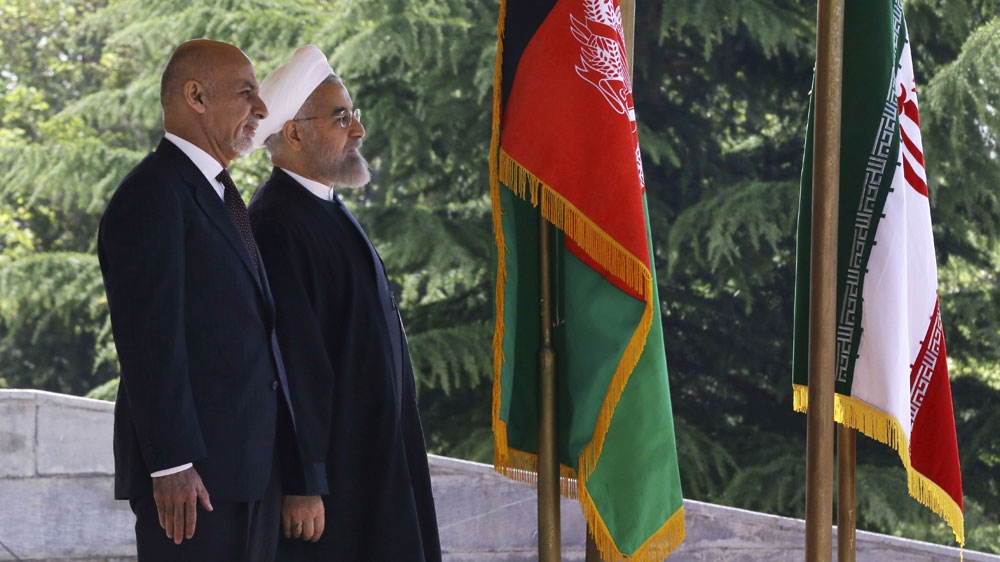Iran’s President Hassan Rouhani recently spoke to Afghan President Ashraf Ghani Ahmadzai and discussed the importance of transportation and trade-related projects being built in the Caspian region that may help to turn around Afghanistan’s lackluster economy and make it easier for the landlocked, war-torn country to do business with western markets.
“Linking Afghanistan's railways to Iran and then to the North-South Corridor is a positive development in economic and business relations between the countries of the region,” Rouhani told Ghani via telephone on November 23, according to the president’s official website.
Afghanistan has long searched for routes that would allow the landlocked country to be less dependent on Pakistan, which uses its port in Karachi to move good northward to Afghanistan.
In May 2016, Iran, Afghanistan and India signed a deal to turn the Iranian port of Chabahar, situated along the Gulf of Oman and near Pakistan, into a transit hub, and creating a trade corridor for Afghanistan. The route is already showing signs of success, as the first shipment of wheat from India arrived in southwestern Afghanistan through Chabahar on November 11.
The route would plug into the larger trade network known as the International North-South Transport Corridor, which will be used to transport goods from the Sea of Oman and the Persian Gulf to the Caucasus and Eastern Europe. India, Iran, Azerbaijan, Russia, Central Asia and Europe will ultimately be linked via the 7,200 km (4,474 mi) of railway tracks.
Rouhani told Ghani during their call that Iran “favors peace, stability, and sustainable security in Afghanistan,” but the two neighbors have had a rocky relationship since the fall of the Taliban in 2001. On the one hand, Tehran has contributed to Afghanistan’s reconstruction and emerged as the country’s largest trading partner, but it has also provided training, money and arms to Taliban militants with the goal of driving U.S. forces from the country.
In January, Afghan governors in southern and western provinces accused Iran of using its close relationship with the Taliban to target power and water projects, in order to safeguard Iranian interests. Iran routinely denies such accusations, saying that its contacts with the Taliban are aimed at helping the country’s peace talks and not instigating instability in the country.
On September 28, U.S. Defense Secretary James Mattis criticized Iran and Russia for providing military and financial support to Taliban fighters in Afghanistan. Mattis’ criticism followed allegations that the Islamic Revolution Guard Corps routinely fight alongside Taliban militias in Afghanistan, and that Russia had distributed small arms to Taliban fighters via Iranian proxies.
During their call, Ghani raised the issue of drug trafficking in the region, and mentioned Afghanistan’s determination to counter it through closer ties with Iran.
Iran is a major transit route for narcotics that are bound for international markets, as it shares a 936 km (581 mi) border with the world’s largest drug supplier, namely Afghanistan, which produces 90 percent of the world’s opium.
According to the UNODC World Drug Report 2014, Iran accounted for 74 percent of the world's opium seizures and 25 percent of the world's heroin and morphine seizures in 2012. Much of the seizures occur in the border areas of Iran, Afghanistan and Pakistan. Iran’s southeastern province of Sistan Baluchestan is known for attracting drug smugglers looking to move narcotics into and out of Pakistan and Afghanistan.
Iran has spent more than $700 million on sealing its borders and preventing the transit of narcotics from Afghanistan destined for European, Arab and Central Asian countries. Counter-narcotics operations have claimed the lives of nearly 4,000 Iranian police officers, and with tens of thousands injured over the past decades.







 Azerbaijan and Armenia started the process of demarcation of their border on Tuesday, with the installation of the first border markers based on ge...
Azerbaijan and Armenia started the process of demarcation of their border on Tuesday, with the installation of the first border markers based on ge...
 Armenian sappers commenced on Monday mine-clearance operations in the territories adjacent to the Saint Mary Church in village of Voskepar (Armenia...
Armenian sappers commenced on Monday mine-clearance operations in the territories adjacent to the Saint Mary Church in village of Voskepar (Armenia...
 Russian Foreign Minister Sergei Lavrov has reasserted that Moscow has no intentions to stop the fighting in Ukraine, even if peace talks commence.
Russian Foreign Minister Sergei Lavrov has reasserted that Moscow has no intentions to stop the fighting in Ukraine, even if peace talks commence.
 Iran has refuted reports of alleged damage to Shimon Peres Negev Nuclear Research Centre located southeast of Dimona, Israel, during the recent air...
Iran has refuted reports of alleged damage to Shimon Peres Negev Nuclear Research Centre located southeast of Dimona, Israel, during the recent air...
 Iran’s Foreign Minister, Hossein Amir-Abdollahian, has labeled a foiled Israeli drone attack in certain parts of the country as a "failure" for Isr...
Iran’s Foreign Minister, Hossein Amir-Abdollahian, has labeled a foiled Israeli drone attack in certain parts of the country as a "failure" for Isr...



